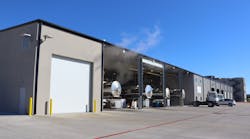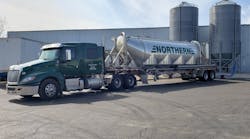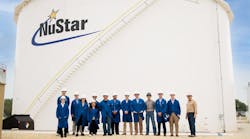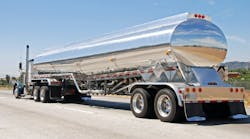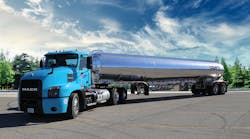Truck and rail service in northern Mexico was severely disrupted by damage resulting from a tropical depression that moved through the region on July 8 and Hurricane Alex, which made landfall on June 30.
Heavy rains washed out highways, roads, and bridges throughout the region. The Rio Grande River reached flood stage in several locations, including Laredo TX/Nuevo Laredo, Tamaulipas. Freight shipments between the United States and Mexico were at an almost complete standstill in the wake of the back-to-back storms, according to Roberto Otanez, president of Superior International, a firm that coordinates liquid bulk inter-line shipments for Superior Bulk Logistics and Transpormex SA de CV.
The storms caused a major disaster, according to A Y “Butch” Bingham, president of Bulkmatic Transport Co, which operates truck-rail transload facilities in the United States and Mexico. Inventories are plastic pellets and other dry bulk cargoes are almost depleted at Bulkmatic’s transload facilities in Mexico and won’t be replenished until rail service can be restored.
“We’re doing everything we can to fix the problems and get cargo shipments moving again,” Bingham says. “We’ve even loaned our two shuttle locomotives in Mexico to the Kansas City Southern railroad to help them restore their service.”
The hurricane had a significant impact on KCS’s primary Mexican rail subsidiary, Kansas City Southern de Mexico SA de CV (“KCSM”), and caused major track damage around the Monterrey, Nuevo Leon, and Saltillo, Coahuila, areas as well as on the lines to Laredo and Matamoros, Tamaulipas, according to KCS officials. There have also been multiple track-related incidents due to the hurricane. KCSM has issued freight embargos at the US-Mexico border and into Monterrey while the damage is repaired. Once the rail lines reopen, it could take up to two weeks to clear congestion and move trains currently parked as a result of the service disruption.
KCS is using all available resources to recover including sending equipment, track materials, and personnel into Mexico from the United States, according to KCS officials. KCSM is working with connecting carriers to maximize opportunities for movement and staging of trains so that when the lines do reopen and congestion clears service will return to normal as soon as possible.
